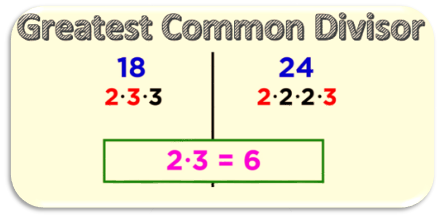We'll be back in a bit !
The system is currently undergoing a routine upgrade to ensure you get the best learning experience. The maintenance is expected to continue till 8:00 pm. Please check back later.
Thank you for your understanding!

The greatest common divisor (GCD) is the biggest number that evenly divides all the other integers when two or more are provided. GCD is useful in a variety of contexts. Instead of repeatedly negating the numerator and denominator of a fraction, using a common divisor to reduce the fraction GCD aids in simplifying and locating the greatest common factor. In the area of statistics, GCD is crucial because it helps in identifying the best results. For instance, to determine how many squared panels will be accommodated in a space.
A divisor is an integer that divides a number by another number. The divisor may split the integer exactly with a zero-remainder division or it may provide decimal or fractional values. For example, 18÷4 equals 4.5. In this case, 4 divides 18 into its decimal equivalent with no remainder. The whole numbers that a number can be split by without leaving any remainder are referred to as its divisor. The list of every possible number that splits a given number is known as its divisors. As in 12÷ 3 =4, where 3 is the divisor of 12 with zero remainders.
Factors of a whole number are the sum of two numbers that equals the whole number or the division and the quotient when a whole number is split by another number with zero remainders. Not all divisors are factors, but all factors are divisors of the integers.
If we repeat the process by dividing the consecutive numbers we will get repeated factors.
The factors of 24 = 1, 2, 3, 4, 6, 12,24.
The highest common factor (HCF) is another name for the greatest common divisor (GCD). (HCF). By using the prime factorization technique,
we can determine the greatest common divisor:
We can determine the GCD of any given set of numbers by repeatedly dividing with prime numbers and multiplying the common numbers together.
Factor method: The greatest number that all of a particular number's possible factors have in common is that number's GCD.
Identify the greatest common factor using the LCM method
The greatest common divisor (GCD) of two positive integers (a, b) can be determined using the following algorithm according to the LCM Method
Using the LCM method, the methods to determine the GCD of (a, b) are as follows:
Step 1- Find the product of a and b.
Step 2- Find the least common multiple (LCM) of a and b.
Step-3- Divide the values obtained in Step 1 and Step 2.
Step 4- The obtained value after division is the greatest common divisor of (a, b).
The Euclid division formula
Applying the formula a = dividend, b = divisor, q = quotient, and r = remainder to an integer
'b' is the GCD if the remainder is equivalent to zero. If the remainder is greater than zero, then the divisor becomes the dividend and the remainder becomes the divisor.
The greatest common divisor (GCD) is also called the highest common factor (HCF). We can find the Greatest common divisor by using
1. Find the GCD of ((i) 960 and 432) using Euclid’s Division algorithm.
Solution
Euclid’s division algorithm,
a = bq + r
a = 960 and b = 432
Here b = 48 which is the greatest common divisor of the given numbers.
2. Find the GCD of ( 16, 12, 32) using the factor method.
Solution:
The factors of 16 = 1, 2, 4, 8, 16
The factors of 12 = 1, 2, 3, 4, 6, 12
The factors of 32 = 1, 2, 4, 8, 16, 32
The common factor = 1, 2 and 4
GCD ( 16, 12, 32 ) = 4
which is the greatest number that divides all the numbers in common.
To determine the largest potential number that has a high degree of similarity, the greatest common divisors or greatest common factors are used. Its components are the divisors with no remainders or zero remainders. The common prime numbers that are put together to determine the GCD or HCF can be found using the prime factorization technique. The highest number that divides precisely must be listed in the factoring method, and its GCD is the highest possible common number.
Q1.What exactly are coprime numbers?
If two or more numbers are given, they are considered to be coprime numbers if their common factor is 1. For instance, 12 and 25 are both prime numbers because they have only 1 as the common factor.
Q2. What exactly are prime numbers?
Prime numbers are those that can only be split by one and themselves. Only the number 2 is an even number on the list of prime numbers. As an example, 2, 3, 5, 7, etc.
Q3. What is the least common factor between 10 and 18?
The prime factorization method can be used to identify the least common multiples. The LCM is found by continually dividing the values given by prime numbers up to 1 and multiplying all the prime numbers altogether.
The provided integers' lowest common multiple is the lowest common denominator.
The lowest common multiple of the numerators of a group of fractions or the specified whole integers is the lowest common denominator.
LCM of 10 and 18 is equal to 90
Therefore, 90 is the lowest common denominator between 10 and 18.
Q4. How was the GCD determined using the long-division method?
The GCD is the divisor when an integer is split with no reminder. If not, we can determine the GCD by repeating the steps, by taking the divisor as dividend and the remainder as divisor each time.
